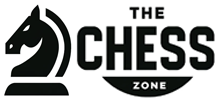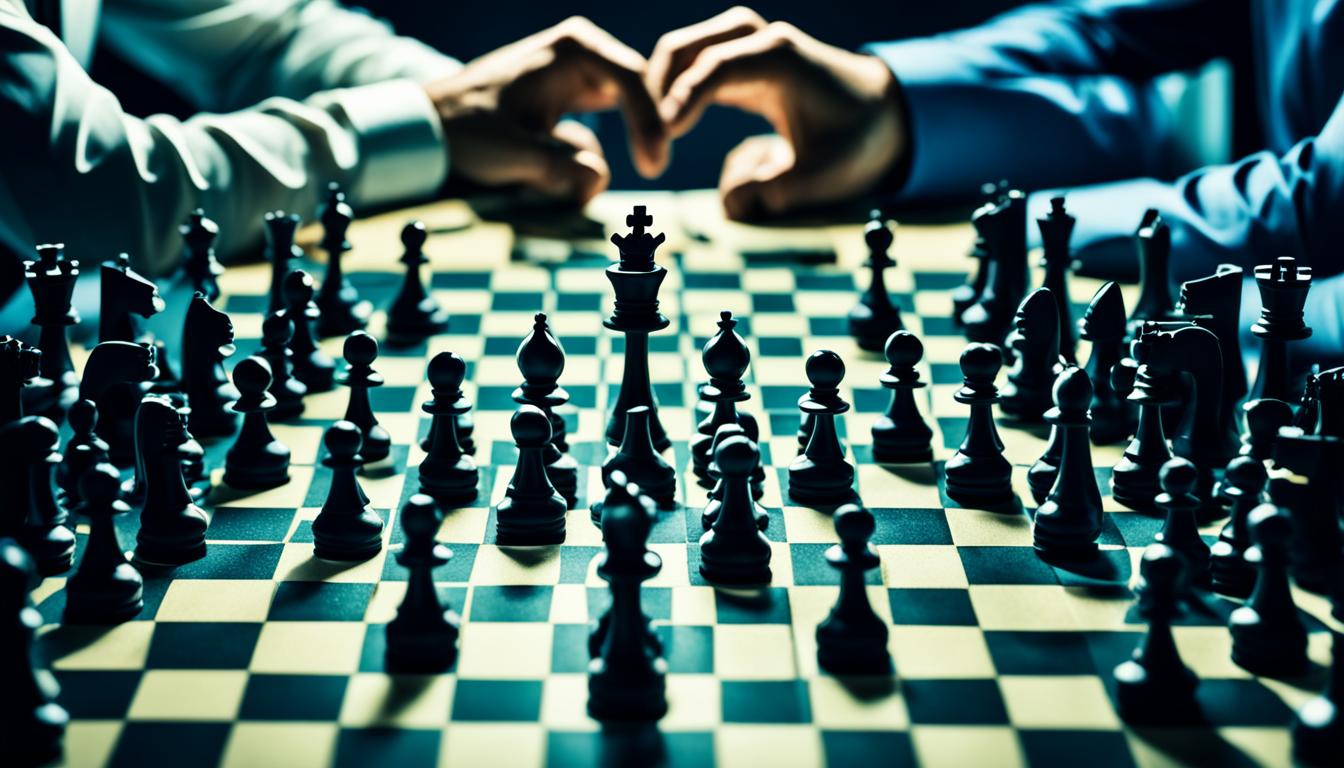Did you know chess has been around for over 1,500 years? It’s enjoyed by more than 600 million people across the globe. *
Want to get better at chess and master the game? You’re in the right spot. This guide will show you 10 strategies to enhance your chess skills.
We’ll cover everything from daily tactics and playing matches to analyzing losses. You’ll learn about boosting your tactics and strategy. Plus, you’ll see how technology can help, the importance of a mentor, and creating a balanced training routine.
So, if you’re just starting or aiming to master chess, be prepared. You’re about to improve your game with these powerful strategies and tips.
Key Takeaways:
- Implement a daily tactics-solving routine to enhance your tactical skills.
- Play competitive chess to gain valuable experience and improve your concentration.
- Analyze your losses to identify mistakes and develop strategies for improvement.
- Study grandmaster games to learn advanced maneuvers and strategies.
- Use chess technology as a tool for analysis, but don’t rely on it entirely.
Step 1: Solve Tactics Daily
Improving your chess skills starts with solving tactics every day. Spend 15-20 minutes on 7-10 tactical problems. This should be part of your daily routine.
Begin with easier problems. They build your confidence and help you learn basic tactics. As you get better, tackle harder puzzles.
Practicing tactics each day boosts your game skills. You’ll get better at finding smart moves and making decisions. This makes you a stronger player.
It’s important to focus on being right, not fast. Take your time to think about each move. Being disciplined like this helps a lot over time.
“Solving tactics is like sharpening your sword. It strengthens your chess intuition and enables you to outmaneuver your opponents.” – Magnus Carlsen
Use a tactics training app or site to see how you’re doing. They have ratings to show your progress. This helps you know what to work on more.
Make it a habit to solve tactics daily. It greatly improves your chess. The more you practice, the better you’ll get at seeing and using tactical moves.
Step 2: Play Competitive Chess
Playing competitive chess is crucial for improving your skills. Online platforms are convenient, but face-to-face competitions are better. They offer unique benefits that help you grow.
In face-to-face chess, you dive deep into the game without distractions. It sharpens your focus. This is key for doing well in tournaments.
Playing opponents in person means facing various styles. Each game teaches you how to adapt. This broadens your chess understanding and improves your play.
While online chess is good for practice, it can’t match over-the-board chess. The atmosphere and direct competition make your games more intense. It boosts your focus.
Always look for chances to play chess in person. Join local tournaments, chess clubs, or play with friends. It’s a sure way to get better.
See practice matches as a chance to learn and get better. Every game is a learning moment. Aim to play against stronger opponents and try new strategies.
Step 3: Analyze All Your Losses
Improving at chess means looking closely at the games you lost, not just the ones you won. Many players forget to do this. Yet, it’s by examining our mistakes that we truly improve.
When you analyze your losses, you see what went wrong. You learn about mistakes that keep happening. This helps you form plans to avoid these errors later.
Focus on the moments in the game where you were behind. Look at your moves to find out when things started to go downhill. Ask yourself if you made any big mistakes or missed chances. Understanding these points lets you grow and make better choices next time.
Studying the positions where you lost is key, too. Check for any weaknesses or imbalances that made you lose. Getting this will aid in making smarter moves in the future.
Mistakes are vital for getting better. They help us polish our skills, understand chess more, and come up with winning strategies. So, don’t avoid looking at your losses – use them to get better on your journey to being a master.
| Mistake | Lesson Learned |
|---|---|
| Blundering a piece | Always double-check your moves to avoid simple blunders. |
| Ignoring the development of minor pieces | Focus on developing all your pieces early in the game to maintain a balanced position. |
| Underestimating your opponent’s threats | Respect your opponent’s potential moves and be vigilant for tactical opportunities. |
| Misjudging the time for pawn breaks | Calculate the consequences of pawn breaks carefully to avoid weakening your position unnecessarily. |
| Playing passively in closed positions | Look for active plans or piece maneuvers to create counterplay in closed positions. |
Step 4: Study Grandmaster Games
Looking at grandmaster games can really boost your chess skills. You learn new moves and strategies by watching top players. This helps you see things you might not find on your own.
Focus on games with good commentary when you study. They often include detailed explanations on why players move as they do. This helps you understand their thinking and the game better.
Try to think like the grandmasters while you study their games. Guess their moves before they make them. This makes you dive deeper into chess strategies. It sharpens your ability to analyze games.
After studying, compare your thoughts with the grandmasters’ actual moves. This lets you see if your analysis matches up. You learn from any mistakes you made. It’s a great way to get better at making decisions in chess.
Remember not to lean too much on chess engines. They’re useful, but your own analysis is key. Use them to enhance, not replace, your thinking.
By diving into grandmaster games, you can improve your own game. You also grow to love chess even more because of its depth.
An Example of a Well-Annotated Grandmaster Game
“The Battle of the Century: Kasparov vs. Deep Blue”
In 1997, Deep Blue, an IBM computer, battled Garry Kasparov, the world champion. This match showed how powerful technology could be in chess.
Deep Blue surprised everyone with innovative tactics. Kasparov fought back with smart strategies. Experts gave interesting insights into every move. It was a clash between human wisdom and computer intelligence.
| Move | Annotation | Analysis |
|---|---|---|
| 1. e4 | A solid opening move, controlling the center and preparing for a strong pawn structure. | Kasparov opted for a classical opening, signaling his intent to establish control and dictate the direction of the game. |
| 1… c5 | The Sicilian Defense, a highly tactical choice that puts pressure on White’s e4 pawn. | Kasparov looks for imbalance and counterplay, choosing a dynamic defense against Deep Blue’s moves. |
| 2. Nf3 | Developing the knight to reinforce center control. | This move keeps White flexible and ready for bringing out more pieces. |
| 2… d6 | It prepares to mirror White’s setup for balance. | Kasparov mirrors White to keep the game even and strategic. |
Diving into grandmaster games and studying them closely broadens your chess knowledge. By analyzing and comparing, you can raise your game to the next level.
Step 5: Use Technology Wisely
Chess technology has changed how we look at games and get better. We have strong chess programs and computer analysis. These tools give us lots of details and insights. But, it’s key to use this tech smartly, know its limits, and not depend on it too much.
Chess engines and software are great for help in reviewing games. They find tactical chances, check positions, and suggest moves. Yet, you should try to analyze games yourself first.
Reviewing games on your own helps grow your thinking and decision skills. Looking at positions without engine help teaches you to trust your judgement. This will make your analysis better and get you ready for real-life games without tech help.
“Tech should help, not be all you rely on. Use your mind first, then look to engines for extra help.”
Using chess tech as extra help can offer great insights and check your thoughts. It’s like having a top chess player helping you see how to get better.
So, use chess tech well, but don’t let it take over your own hard work in game analysis. Balancing tech tools with your own reviews makes your skills broader and boosts your chess playing.
Step 6: Get a Mentor
A mentor can change your chess game for the better. They have the experience to guide and improve your skills fast. They offer advice, discuss problems, and analyze your games to spot areas needing betterment.
When looking for a mentor, choose someone successful in chess. They should understand the game well and know how to share their knowledge effectively.
“A good mentor can provide guidance and support, helping you navigate the complexities of chess and pointing out areas where you can further enhance your skills.” – John Smith, Chess Grandmaster
Advice and feedback from a mentor give you new strategies. They point out patterns in your play and suggest better moves. This insight could be something you’d miss on your own.
Mentors also motivate and encourage you. They help you through tough times and keep you focused on goals. Their wisdom comes from overcoming chess challenges themselves.
For a good mentorship, be open and interact with your mentor. This is a chance to learn from someone who’s been in your shoes. They want you to grow as a player.
If you’re aiming to boost your chess skills, find a mentor. They could be key to reaching your best on the board.
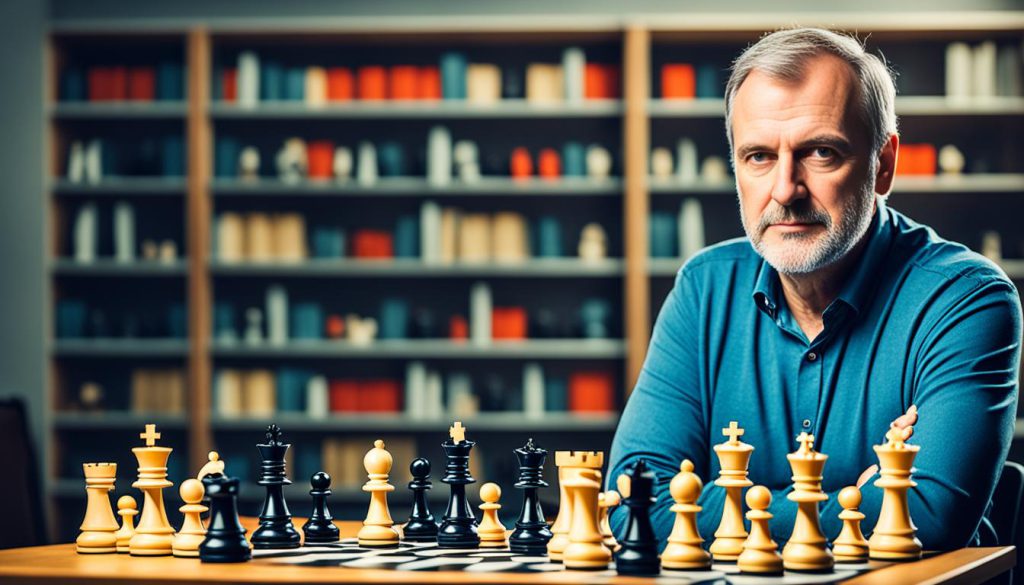
The Benefits of Having a Chess Mentor:
- Accelerated skill development
- Access to valuable advice and insights
- Game analysis and feedback
- Motivation and encouragement
- Opportunity to learn from someone with more experience
Step 7: Follow 20/40/40 Rule
Improving your chess skills means working on every part of the game. The 20/40/40 rule helps you do that in a balanced way. It lets you focus on each part of the game properly.
Opening: 20%
Use 20% of your time to learn and practice chess openings. Get to know different opening strategies. Learn the big ideas behind them. A good set of openings gets you ready for various positions and strong attacks.
Middlegame: 40%
Put 40% of your time into the middlegame. This is where most action happens. Learn about different pawn structures and strategic ideas. Improve how you make decisions, judge positions, and plan moves. The middlegame lets you be creative and beat your opponents.
Endgame: 40%
Also, spend 40% of your time on the endgame. It’s seen as chess’s purest part. Understand key endgame principles like king activity and pawn movements. Get better at making smart moves and turning small leads into wins. Being accurate and strategic in the endgame is key.
Tactics, Strategy, and Analysis
Don’t just focus on openings, middlegames, and endgames. Work on tactics, strategy, and game analysis too. Solve puzzle to better your skills and learn strategic concepts. Reviewing your games helps find mistakes and areas to get better at.
By sticking to the 20/40/40 rule and working on tactics, strategy, and game review, you’ll build strong chess skills. Skipping any game aspect can slow your progress. Being strong in every part of the game helps you play with confidence and win.
Step 8: Build a Chess Library
To get better at chess in the long run, you need a good chess library. Having a lot of chess resources, training materials, and chess books is key for strong players. These materials give you lots of knowledge and insights from experts.
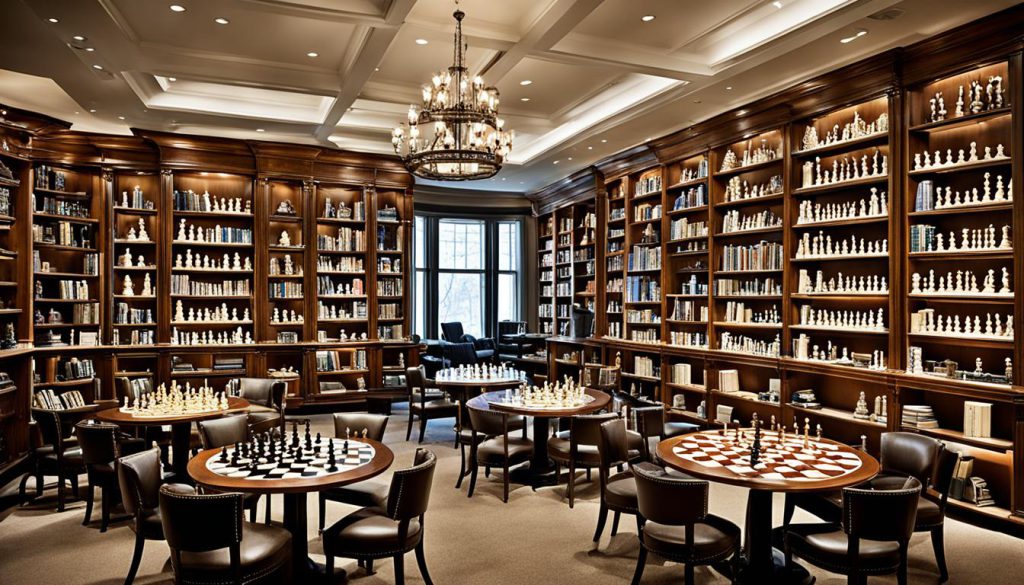
- Revisit Concepts: You can go over important chess ideas and strategies with chess books, videos, and courses. This helps make sure you really understand the key points.
- Learn from Experts: A chess library is full of books and materials from great players. They show you how these experts think and make decisions. Learning from them can greatly improve your own play.
- Discover New Ideas: Chess materials often show new strategies and moves you haven’t seen before. They can expand your play style and surprise your opponents.
I always keep a lot of chess books and materials close by. They are valuable and inspire me a lot. Having a chess library has helped me grow as a player because I keep learning new things.
– Magnus Carlsen, World Chess Champion
Creating a chess library is an ongoing effort. Keep adding new things to stay interested and to learn new concepts. It could be classic books or the newest videos. The important thing is to choose materials that you like and that help you improve.
Step 9: Stay Positive
Keeping a positive mindset is key in chess progress. A positive mindset helps tackle challenges with hope and toughness. This means you can beat obstacles and climb higher in your game.
Seeing failures as chances to learn is vital for positivity. If you stumble or err, think of them as ways to get better. Looking at your mistakes closely helps you learn and tweak your play.
“Failure is not the opposite of success; it is part of success.”
All chess players, even the pros, face setbacks. It’s just part of learning. By facing these head-on with a smile, you nurture a mindset of growth. This helps you stick with it through the tough times.
Keep your eyes on your goals and what you want to win. When obstacles show up, look for paths around them instead of giving up. See challenges as chances to grow and better yourself.
Chess demands strategy and the will to keep going for mastery. A sunny outlook helps you face hurdles, get up from losses, and keep improving.
So, hold onto positivity in your chess adventure. See the tough times as lessons, and push through hardships. With optimism, you’ll uncover your true potential and soar high in chess.
Key Takeaways:
- Keeping upbeat is critical for chess success.
- View failures as moments to learn and advance.
- Approach hurdles with a positive mindset and aim for your goals.
- Overcome difficulties and use them as ways to improve.
- Staying positive is a key quality of triumphant chess players.
Step 10: Train Other Chess Players
Training others in chess is fulfilling and enhances your skills. Teaching helps you understand the game better and improve.
Explaining chess concepts makes you articulate them clearly. This deepens your understanding and lets you see the game differently. It helps you spot areas for your own improvement.
A thorough understanding of chess is needed to teach well. Preparing lessons enhances your mastery and broadens your technique knowledge.
“The best way to reinforce your own understanding is by teaching others. By sharing your knowledge, you help solidify your own knowledge and become a better player in the process.”
– Grandmaster Aman Hambleton
Teaching chess lets you discover your own knowledge gaps. When students ask tough questions, it pushes you to learn more and fill those gaps. This strengthens your gameplay.
Seeing your students succeed brings joy and motivation. It pushes you to keep getting better. Such an environment benefits everyone with shared knowledge and growth.
In summary, training chess players is beneficial for all. It enhances your game, solidifies knowledge, and helps the chess community. Take the chance to teach and see your skills grow.
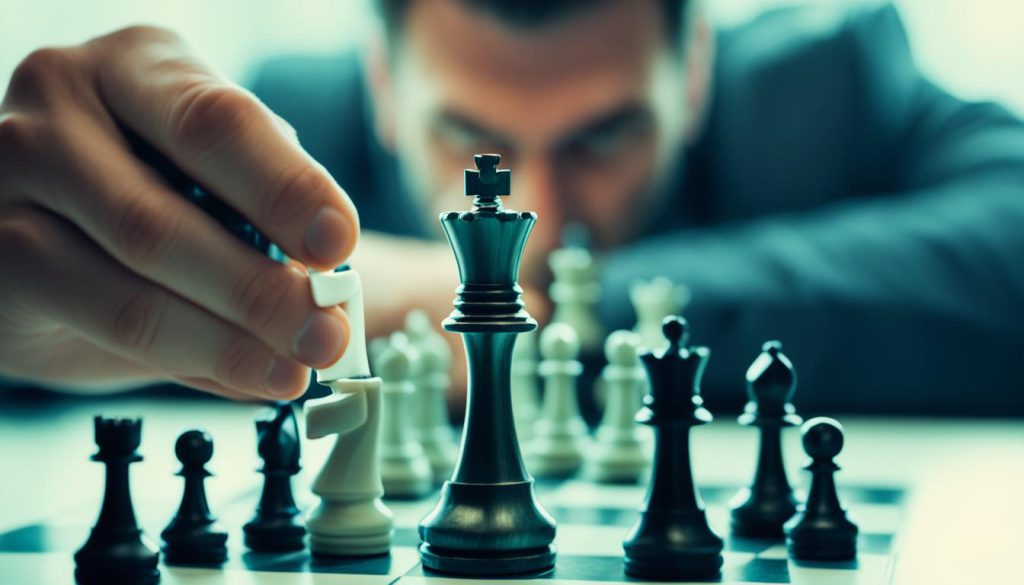
| Benefits of Training Other Chess Players: |
|---|
| 1. Reinforces your own understanding of the game |
| 2. Enhances your mastery of different chess techniques |
| 3. Helps identify weaknesses in your own gameplay |
| 4. Creates a positive and supportive chess community |
| 5. Motivates and inspires you to continue improving |
Conclusion
To get better at chess, you need a plan and hard work. Use good strategies to improve your game and aim for excellence.
Do chess puzzles every day. This sharpens your skills in seeing good moves and winning the game.
Playing chess in real life and online is very useful. It lets you try your strategies against others. Assessing your losses, learning from top players, and using tech are essential. They help you get better at different parts of chess.
Having a coach, following a structured training plan, and having a collection of chess books are important. Being positive and teaching others also helps. These steps will guide you to continuous growth in chess.
Always practice, learn from errors, and see challenges as chances to get better. These tips will help you reach your full potential in chess.
